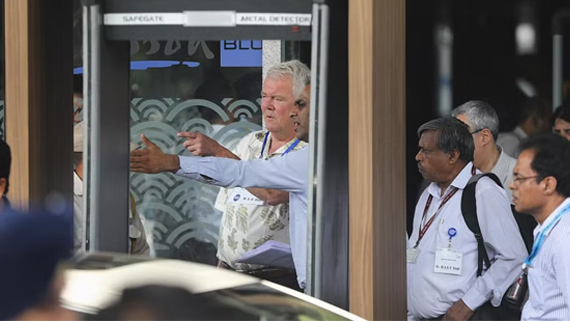Chandigarh: Delegations from India and Pakistan on Monday (24 June) commenced inspections of two power projects in Jammu and Kashmir’s Kishtwar district under the Indus Waters Treaty (IWT). This marks the first visit by a Pakistani delegation to the region in over five years, as officials began their assessments alongside neutral experts.
The Indus Waters Treaty, signed after nine years of negotiations with the World Bank as a signatory, establishes a framework for cooperation and information exchange between India and Pakistan regarding the use of cross-border river waters. This current inspection follows a 2019 visit, the last before the bilateral relations cooled due to the revocation of Jammu and Kashmir’s special status.
The delegation of about 40 people arrived in Jammu on Sunday (June 23) evening and proceeded to Kishtwar on Monday morning to inspect several under-construction power projects in the Chenab valley region. Their first destination was the 85 MW Ratle hydroelectric power project at Drabshalla.
In addition to Ratle, the delegation will inspect the 1,000 MW Pakal Dul hydroelectric project on the Marusudar River, a tributary of the Chenab, and other ongoing projects in the area during their stay. Upon arrival, the team visited the headquarters of the National Power Hydroelectric Corporation (NHPC).
According to reports in Indian Media, Pakistan initially raised objections to the design of the two hydroelectric projects in 2016, requesting intervention from the World Bank and seeking settlement through a neutral expert. However, they later withdrew this request, opting instead for adjudication via a Court of Arbitration.
But reports in Pakistani media say Pakistan initially opted for an arbitration court but later agreed to proceed with neutral experts, a stance India has consistently favored.
After stalled negotiations, the World Bank appointed a neutral expert and the head of an arbitration court in October 2022.
In a significant development, the arbitration court declared its jurisdiction in July 2023 to address the matters raised by Pakistan, who submitted pertinent legal documents in March 2023. Meanwhile, India, refusing to engage in arbitration proceedings, pushed for a neutral expert’s review in August 2023.
Most recently, in September, Pakistan participated in discussions held in Vienna under the appointed neutral expert, continuing the complex legal and diplomatic engagement over these contentious water projects.

